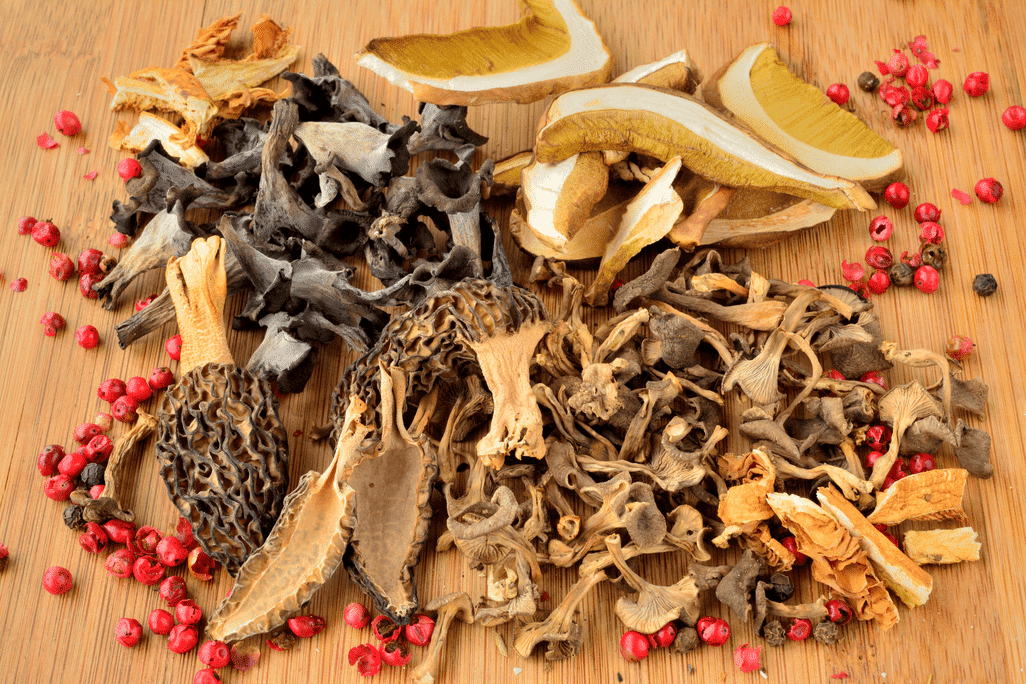Edible medicinal mushrooms are gaining popularity today as a superfood. Medicinal mushrooms are a rich source of nutrients, antioxidants and vitamins.
Fungi-derived extracts have been well-studied for their biologically active compounds, including antiviral and anti-bacterial properties. Around 40% of modern drugs and 49% of new chemical products registered by the United States Food and Drug Administration (FDA) are based on natural products or their derivatives. Among them, over 270 species of mushrooms are classified as having medicinal properties.
The practitioners at Good Medicine Choice Network have used Immune Support Medicinal Mushroom Blend with Lion’s Mane as part of their treatment of chronically ill individuals with autoimmune diseases, chronic infections, pulmonary disease, fatigue and more. GMC’s Mushroom Blend capsules contain immune-boosting medicinal mushrooms such as reishi, chagaChaga mushrooms have been used for centuries in traditional medicine to help balance the mind and body. Recognized for their anti-aging, antimicrobial properties, people have also used them to help support immune function, fight inflammation, and aid in proper digestion., lion’s maneLion’s Mane is a natural nootropic super mushroom. Monks have used it to help their meditation practice for thousands of years to help support their concentration, energize their minds, enhance focus, inspire creativity, and help support daily immune functions. and turkey tail.
A 2017 study in the International Journal of Food Sciences and Nutrition looked at different cooking methods and found that mushrooms release more of their nutrients when exposed to shorter cooking times. Check out this guide to cooking with medicinal mushrooms from the Academy of Culinary Nutrition.
For detail and information on medicinal mushrooms, read our blog article, “The Top 8 Edible Mushrooms to Stimulate Your Immune System.”
What are the properties of Medicinal Mushrooms?
Mushrooms are a widely consumed, low-calorie, low-cholesterol, and low-sodium health-promoting food. Mushrooms possess an abundance of health benefits. They may improve the immune system’s ability to fight infection against viral, bacterial, and parasitic pathogens.
Mushrooms Possess Unique Blend of B Vitamins
Mushrooms are a source of plant protein, complex carbohydrates, minerals, fiber and vitamins like D and B12. Many mushrooms possess a unique blend of B vitamins, including B2, B3 and B6. Mushrooms synthesize B12, an essential nutrient found rarely in other plant species. Vitamin B12 is a neuroprotective vitamin found mainly in meat.
B vitamins are essential for converting food into fuel and help to keep the digestive system healthy.
Mushrooms Contain Nutrients Like Potassium, Selenium and Protein
Mushrooms are a source of many nutrients, including fiber, protein, selenium, and potassium. Mushrooms increase Vitamin D, a vitamin that is being explored for its potential role in reduced severity in COVID-19 illness. Many mushrooms also contain vitamin E and C, which is vital to the body’s healing process.
Edible Mushrooms Possess Immune-Stimulating Properties
Edible mushrooms possess several bioactive components, such as alkaloids, phenols, flavonoids, terpenes and polyunsaturated fatty acids, A polysaccharide commonly present in mushrooms, β-glucan, has been studied for its immune-stimulating and prebiotic properties.
Mushrooms Protect Cells’ DNA, Have Anti-tumor Agents
Specific types of mushrooms have been shown to have potential in protecting against cancer by protecting our cells against DNA damage. A number of bioactive molecules, including anti-tumor agents, have been identified from various mushrooms. Mushrooms also have been recommended during radiation and chemotherapy to reduce side-effects such as nausea, bone marrow suppression, anemia, and lowered resistance.
Cardiovascular and Anti-Inflammatory Properties
Mushrooms are shown to have therapeutic properties that can help protect the heart by maintaining healthy blood pressure and circulation. Mushrooms contain polysaccharides that can contribute to healthy microbiotica in the gastrointestinal tract and have been shown to defend against cardiovascular disease, high cholesterolcholesterol cho·les·ter·ol | \ kə-ˈle-stə-ˌrōl Cholesterol is a waxy, fat-like substance that's found in all the cells in your body. Your body needs some cholesterol to make hormones, vitamin D, and substances that help you digest foods. Your body makes all the cholesterol it needs. Cholesterol is also found in foods from animal sources, such as egg yolks, meat, and cheese. and diabetes. Phytonutrients in mushrooms can help prevent cells from sticking to blood vessel walls and forming plaque build-up. This in turn then helps protect the heart by maintaining healthy blood pressure and circulation.
Mushrooms’ Brain-Boosting Properties
Preliminary experiments suggest that some mushrooms, like lion’s mane, contain compounds that may enhance cognitive function and stimulate nerve growth in the brain.
A unique antioxidant present in mushrooms could have a protective effect on the brain, a study from Singapore suggests. A six-year study tracking the diet and lifestyle of 663 adults found that eating mushrooms more than twice a week could prevent memory loss and reduce the risk of mild brain decline in study participants over 60 years old.
Visit the Good Medicine Choice Network Shop to explore GMC’s anti-inflammatory and antioxidant dietary supplements, multivitamins and essential oils. All product prices include shipping costs.


No comments yet. Be the first one to leave a thought.